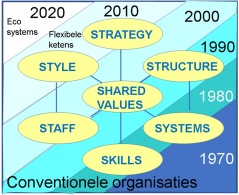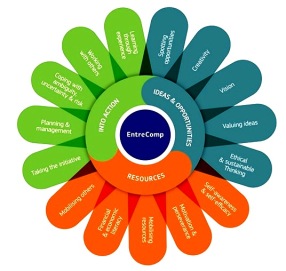a language for innovation
During the twentieth century (especially large) organisations were formed according to the Uniformity principle. The French contributed with their functional thinking, the Germans with their hierarchical thinking and the Americans with their model thinking. But the structures and the organisational thinking that gave organisations stability and grip started to falter at the beginning of this century. They were too static and slowly we started to realize that renewal and innovation had become the engine of economic growth.
Scheme to the right: The influence of IT and internet on the structure of an organisation over the decades, plotted on McKinsey's 7S model. Update of a model in Henk Bremers publication Management Sourcing, 2000
After the introduction of internet a large intertwining of organisations arose and a strong interdependency between organisations and their systems and an ever higher pace of change dynamics.
Stimulating innovation had become a theme of high priority for authorities.
But how? And how can we stimulate innovative entrepreneurs?
The search for a common language, to talk about and to promote innovation, also lead to a number of subsidized projects to find a common language and also to find the type of enterprising personalities.
Most efforts lead to a competence model, but some of the subsidized projects even developed a personality questionnaire, they more or less tried to redefine the work of psychologists (e.g. the Fincoda project).
LDpe tries to follow all these efforts and to connect them to the LD-Toolbox, such that we can help entrepreneurs accelerate their development and that of their teams and organisations.
ENTRECOMP, the European Entrepreneurship competency framework
It has lasted a while, but in 2018 the European Commission published the model which can be used as the standard and common entrepreneurs-development language. It will take a while before all involved parties make use of it.
'Not invented here' plays a roll, of course, but in the end Entrecomp will become the de-facto standard.
Value creation in any sphere of life
Turning ideas into shared value is equally relevant to progressing one's career, supporting one's local sports team or establishing a new social enterprise. Entrepreneurial value creation and entrepreneurial learning can take place in any sphere of life.
By focusing on the development of competences through the actual creation of entrepreneurial value, EntreComp breaks down the boundaries between education, work and civic engagement. In this respect, the EntreComp is transversal to formal, non-formal and informal learning contexts and applies equally to education and training systems --from primary to vocational education and training-- and to non-structured learning contexts including civil society, communities, youth work, start-ups and existing organisation such as corporations, non-governmental organisations or public administrations.




